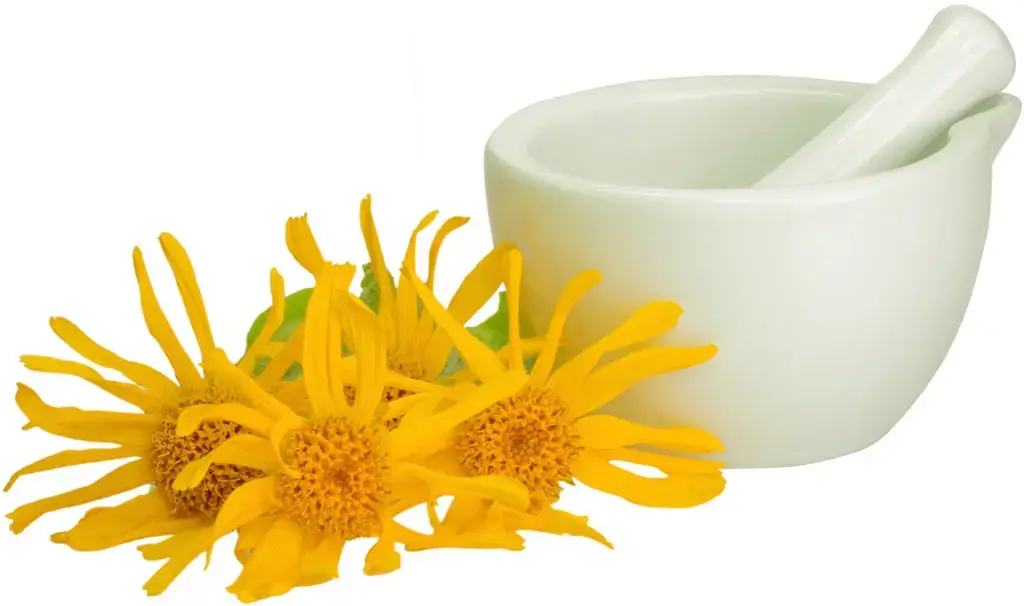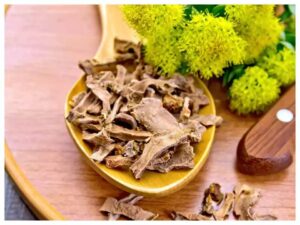Arnica, also known as Arnica montana, is a well-known herb that has been used for centuries for its healing properties. This powerful plant has a long history of use in traditional medicine, dating back to the 16th century. In this article, we will discuss the discovery of Arnica and its use throughout history.
Origins of Arnica
Arnica is native to the mountainous regions of Europe and North America. The plant has been used for centuries by indigenous people for its medicinal properties. In the 16th century, European herbalists and physicians began to take notice of Arnica and its healing properties.
Early Uses of Arnica
In traditional medicine, Arnica was used to treat a wide range of conditions, including skin wounds, bruises, joint pain, and muscle soreness. It was also used as a remedy for headaches, insect bites, and rheumatic conditions.
Scientific Studies on Arnica
As science and medicine advanced, so did the study of Arnica. In the 19th and 20th centuries, scientists conducted numerous studies on the plant, investigating its properties and potential therapeutic benefits. These studies showed that Arnica has anti-inflammatory, pain-relieving, and wound-healing properties.
Modern Use of Arnica
Today, Arnica is widely used in modern medicine and alternative health practices. It is commonly used in topical creams, gels, and ointments for the treatment of bruises, muscle soreness, and joint pain. It is also available in oral forms, including tablets and tinctures, for the treatment of conditions such as headaches and arthritis.

The Benefits of Arnica for Health
Arnica, also known as Arnica montana, is a well-known herb that has been used for centuries for its healing properties. This powerful plant has a long history of use in traditional medicine, and its benefits for health are now being recognized by modern medicine. In this article, we will discuss the benefits of Arnica for health.
Anti-Inflammatory Properties
Arnica has strong anti-inflammatory properties, making it an effective remedy for a variety of conditions. Inflammation is a natural response to injury or infection, but chronic inflammation can lead to a range of health problems, including joint pain, heart disease, and certain types of cancer. Arnica has been shown to reduce inflammation and improve symptoms in conditions such as osteoarthritis, rheumatoid arthritis, and other inflammatory conditions.
Pain Relief
In addition to its anti-inflammatory properties, Arnica is also known for its pain-relieving effects. It has been used for centuries to relieve pain from injuries, such as bruises, sprains, and strains. It has also been shown to be effective in reducing pain from conditions such as arthritis, headaches, and menstrual cramps.
Wound Healing
Arnica has been used for centuries as a wound healer, and modern research has confirmed its efficacy in this area. Arnica has been shown to improve the healing of cuts, scrapes, and other wounds, as well as reduce the appearance of bruises and scars.
Stress Relief
In addition to its physical benefits, Arnica has also been shown to have stress-relieving properties. Stress can have a negative impact on our physical and mental health, and Arnica has been shown to reduce stress and improve overall well-being.
Immune System Support
Arnica has also been shown to have a positive effect on the immune system. It has been shown to increase the production of white blood cells, which play a key role in fighting infection and disease. Arnica may also help to reduce the severity and duration of colds and other illnesses.
Conclusion
Arnica is a powerful herb with a long history of use in traditional medicine. Its benefits for health are now being recognized by modern medicine, and its anti-inflammatory, pain-relieving, wound-healing, stress-relieving, and immune-boosting properties make it a valuable tool for promoting overall health and well-being.

The Nutritional Components and Core Ingredients of Arnica
Sesquiterpene Lactones
Sesquiterpene lactones are the main active components of Arnica. These compounds are known for their anti-inflammatory and pain-relieving properties. Sesquiterpene lactones help to reduce inflammation and swelling, which can alleviate pain and improve mobility. Additionally, these compounds have been shown to have a positive effect on the immune system, making Arnica a valuable addition to anyone’s daily routine.
Flavonoids
Flavonoids are another important component of Arnica. These compounds have strong antioxidant properties and are known for their ability to protect the body against damage from free radicals. Additionally, flavonoids have been found to have a positive effect on the immune system and may help to reduce inflammation.
Ester-Like Compounds
Ester-like compounds are also present in Arnica. These compounds have been shown to have anti-inflammatory properties and are believed to play a role in reducing pain and swelling. Additionally, ester-like compounds have been found to have a positive effect on the immune system, making Arnica a valuable addition to anyone’s daily routine.
Coumarins
Coumarins are another important component of Arnica. These compounds have been found to have anti-inflammatory properties and are believed to play a role in reducing pain and swelling. Additionally, coumarins have been found to have a positive effect on the immune system, making Arnica a valuable addition to anyone’s daily routine.
Essential Oils
Arnica also contains essential oils, including thymol, carvacrol, and eucalyptol. These oils are known for their anti-inflammatory and pain-relieving properties and are believed to play a role in reducing pain and swelling. Additionally, essential oils have been found to have a positive effect on the immune system, making Arnica a valuable addition to anyone’s daily routine.

Methods for Consuming Arnica
Arnica is a powerful herb that has been used for centuries to treat a variety of health problems, including pain, inflammation, and bruises. In this article, we will explore the different methods for consuming Arnica, including cooking and supplement form.
Cooking with Arnica
Arnica can be used in cooking to add flavor and health benefits to your meals. The flowers of the Arnica plant are edible and can be used to make tea or added to soups and stews. The leaves of the plant can also be used in cooking, but it is important to note that they should not be consumed in large quantities as they can be toxic. When using Arnica in cooking, it is important to follow a recipe and not exceed recommended amounts.
Arnica Supplements
Arnica supplements are widely available and can be purchased in a variety of forms, including capsules, creams, gels, and ointments. Arnica supplements are a convenient and effective way to enjoy the health benefits of this herb. When purchasing Arnica supplements, it is important to look for products that are made from high-quality, pure Arnica extract. Additionally, it is important to follow the instructions on the product label and not exceed recommended amounts.
Arnica Supplements: Types and Benefits
There are several types of Arnica supplements available, each with its own unique benefits.
Arnica Capsules
Arnica capsules are a convenient and effective way to consume Arnica. They are usually taken orally and are an excellent option for those who do not enjoy the taste of Arnica tea or who have trouble using creams and ointments. Arnica capsules are available in different strengths and can be taken on a daily basis to help maintain overall health.
Arnica Creams, Gels, and Ointments
Arnica creams, gels, and ointments are topically applied and are an excellent option for those who suffer from pain and inflammation. These products are applied directly to the skin and are absorbed quickly, providing fast and effective relief. Arnica creams, gels, and ointments are available in different strengths and can be used on a daily basis to help maintain overall health.

Potential Side Effects and When to Avoid Taking Arnica
Arnica is a powerful herb that has been used for centuries to treat a variety of health problems, including pain, inflammation, and bruises. While Arnica is generally safe when used as recommended, it is important to be aware of potential side effects and when to avoid taking this herb.
Potential Side Effects
Arnica is generally considered safe when used as recommended. However, some people may experience mild side effects, including skin irritation, itching, and redness. Additionally, Arnica should not be used on broken or damaged skin, as it can cause further irritation.
In rare cases, some people may experience more severe side effects, including stomach upset, dizziness, and headache. If you experience any of these side effects, it is important to stop using Arnica and seek medical attention if necessary.
When to Avoid Taking Arnica
Arnica should be avoided by pregnant and breastfeeding women, as the safety of this herb has not been established in these populations. Additionally, Arnica should not be used in large quantities, as it can be toxic. If you have a medical condition or are taking prescription medications, it is important to talk to your doctor before using Arnica.
Arnica should also be avoided by people with an allergy to the Asteraceae/Compositae plant family, as they may have an allergic reaction to Arnica. If you have a history of allergies, it is important to talk to your doctor before using Arnica.
The Drug interaction
Arnica can interact with certain medications and supplements, including blood-thinning medications, such as warfarin, aspirin, and heparin, and nonsteroidal anti-inflammatory drugs (NSAIDs), such as ibuprofen and naproxen. Arnica may increase the risk of bleeding when taken with these medications.
Additionally, Arnica may interact with diuretics, such as furosemide and hydrochlorothiazide, and may increase the risk of dehydration. Arnica may also interact with heart medications, such as digoxin and ACE inhibitors, and may increase the risk of side effects.
If you are taking any prescription medications or supplements, it is important to talk to your doctor before using Arnica. Your doctor can help you determine if Arnica is safe for you and if any drug interactions are likely to occur.
It is also important to be aware that Arnica is not regulated by the FDA, and the quality and purity of products can vary. Before using Arnica, it is important to choose a reputable brand and to follow the instructions on the product label.
- WebMD: https://www.webmd.com/vitamins/ai/ingredientmono-764/arnica
- Memorial Sloan Kettering Cancer Center: https://www.mskcc.org/cancer-care/integrative-medicine/herbs/arnica
- Drugs.com: https://www.drugs.com/npp/arnica.html
- Natural Medicines: https://naturalmedicines.therapeuticresearch.com/databases/food,-herbs-supplements/professional.aspx?productid=976






